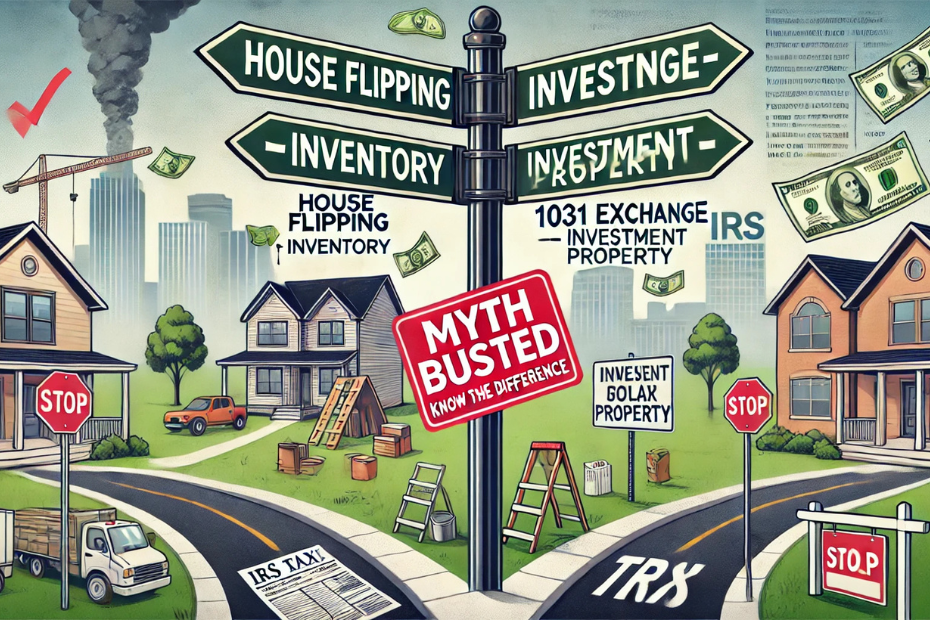This Myth is More Common than You Think:
You Can Use an Exchange to Defer Taxes on Your House Flipping Business
If you’ve been following me, you know I love digging into the myths that swirl around 1031 Exchanges. And here’s one that comes up more than you might think: “I can use a 1031 Exchange to defer taxes when I flip a house.”
Sounds nice, right? Buy a house, slap on some paint, replace the kitchen, flip it for a profit, and then just roll those gains into another property tax-free. Unfortunately, it doesn’t work that way, yet there are flippers online that say they use it. I just hope they don’t get audited!
Why the Myth Exists
The basic rule of a 1031 Exchange is simple: if you sell investment property and reinvest the proceeds into like-kind investment property, you can defer paying capital gains taxes. Investors hear that and think: “Well, I’m buying property and selling property. Isn’t that investing?”
Not quite. The IRS doesn’t just look at what you bought—it looks at why you bought it. Your intent matters.
Inventory vs. Investment Property
Here’s the real kicker: in the eyes of the IRS, properties bought with the intent to immediately fix, and sell are not investments. They’re inventory.
Think of it this way: Home Depot doesn’t “invest” in hammers. They sell hammers. That’s their inventory. If your business model is to buy properties, improve them, and sell them quickly for profit, then those properties are your inventory. And inventory doesn’t qualify for 1031 Exchange treatment.
The IRS Test: Hold for Investment
The IRS has been crystal clear on this point: to qualify for a 1031 Exchange, you must hold property for investment purposes. That doesn’t mean you have to own it for a specific number of years (another myth I’ve already busted), but you do need to demonstrate genuine intent to hold it for income or long-term appreciation.
A rental property? That qualifies. A strip center you have owned for several years as part of your portfolio? That qualifies. But a property you buy in January, remodel in March, and list in April? That’s not investment—it’s inventory.
Flippers Are Taxed as Dealers
Here’s another wrinkle: house flippers are typically treated as “dealers” by the IRS. Dealers don’t enjoy capital gains treatment on their profits at all. Their profits are taxed as ordinary income—and sometimes even subject to self-employment tax.
So not only can’t you use a 1031 Exchange, but the tax bill on flipping income is generally higher than the long-term capital gains rate. That’s a double whammy most flippers don’t see coming.
What If You’re Both a Flipper and an Investor?
Now, some of you are thinking: “Okay, but what if I flip houses and also own rentals? Can I use 1031 on the rental side?”
The answer is yes—you can. If you’re holding some properties genuinely for investment, those can qualify for a 1031 Exchange. The key is separating your business inventory (the flips) from your investment portfolio (the rentals, commercial assets, or long-term holds). Keep good records, work with a knowledgeable CPA, and be crystal clear on your intent when you acquire each property.
Why This Myth Matters
The danger of this myth is that it lulls people into thinking they can operate a flipping business while kicking the tax can down the road. They can’t. The IRS doesn’t play games here. If your strategy is quick turnaround for profit, you need to plan for the tax bill—because a 1031 Exchange won’t bail you out.
Flipping is a business. Investing is an investment. The IRS makes that distinction loud and clear. So don’t fall for the myth that you can flip houses all day long and roll those profits tax-free into your next project with a 1031 Exchange.
If you’re not sure whether your situation qualifies, that’s where the right advisors—CPAs, tax attorneys, and seasoned 1031 brokers like me—come in. We’ll help you separate fact from myth and make sure your strategy is on solid ground.
We Are Here to Help!
If you are an investment property owner who is interested in a no obligation, private consultation, please visit www.Best1031Online.com, or contact James Bean
of SVN-Rich Investment Real Estate Partners, CA DRE# 01970580, at 805-779-1031
or email at [email protected].
If you are an agent/broker, I am happy to discuss strategies with you on how to best serve your next listing client in preparing them for a successful exchange. Please visit the site and click on the Agent’s button located at the top right-hand corner of the Home Page!
Don’t know what certain terms mean?
Click here for a Glossary of Terms: https://svn-best1031online.com/glossary/
Want more on the 1031 Exchange?
Come join me on my YouTube Channel “Best 1031 Online.”
The ONLY channel 100% dedicated to all things 1031!
And visit CRE Task Wizard at https://cretaskwizard.com/, who supports me in making the channel happen.
Please stay tuned and follow me on LinkedIn, X (formerly known as Twitter), Instagram, & Facebook @1031BrokerJames.
All information is deemed to be accurate and is not tax or legal advice. All investors/taxpayers should consult their CPA, tax attorney, and investment advisors.
